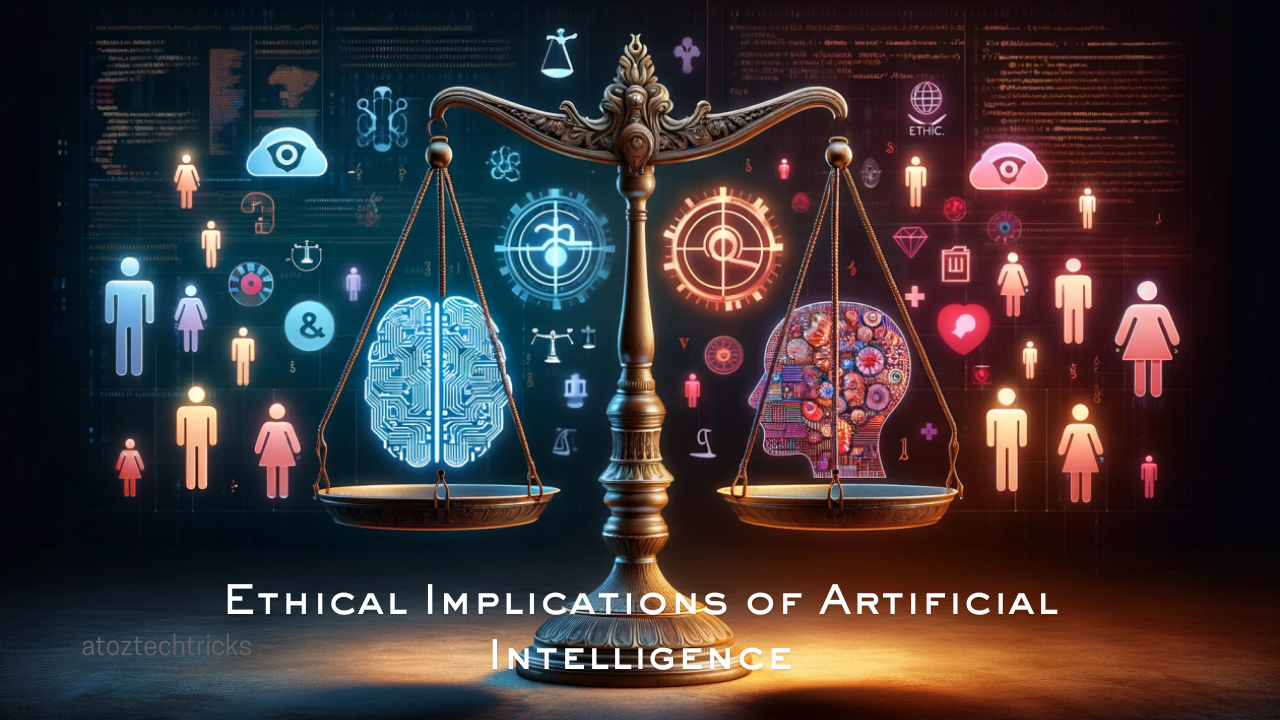Artificial Intelligence (AI) has rapidly advanced over the past few decades, transforming industries, enhancing productivity, and offering unprecedented opportunities for innovation. However, as AI continues to evolve, it brings with it a host of ethical considerations that must be carefully examined. The ethical implications of AI are vast, encompassing issues related to privacy, bias, accountability, and the potential consequences of autonomous systems. This article delves into the key ethical concerns surrounding AI and explores how society can navigate these challenges to ensure that AI is developed and deployed responsibly.
1. Understanding Artificial Intelligence: An Overview
Artificial Intelligence refers to the ability of machines to perform tasks that typically require human intelligence. These tasks include learning, reasoning, problem-solving, understanding natural language, and recognizing patterns. AI systems can be broadly categorized into narrow AI, which is designed for specific tasks, and general AI, which aims to replicate human cognitive abilities.
Narrow AI, such as facial recognition systems and recommendation algorithms, is already widely used in various sectors, from healthcare to finance. General AI, on the other hand, remains a theoretical concept, with researchers still exploring its potential and implications.
2. Privacy Concerns in the Age of AI
One of the most pressing ethical issues related to AI is privacy. AI systems often rely on vast amounts of data to function effectively, raising concerns about how this data is collected, stored, and used. The ability of AI to analyze and interpret data at an unprecedented scale has significant implications for individual privacy.
Data Collection and Surveillance
AI-driven technologies have the potential to enable mass surveillance, as they can process large datasets to identify patterns and behaviours. Governments and corporations can use AI to monitor citizens, track their movements, and analyze their online activities. While this can be beneficial for national security and crime prevention, it also poses a threat to individual privacy and civil liberties.
The Cambridge Analytica scandal, where personal data from millions of Facebook users was harvested without their consent and used for political advertising, highlights the risks associated with data collection and AI. Such incidents underscore the need for stringent regulations to protect user privacy and ensure that data is used ethically.
Informed Consent and Data Ownership
Another ethical concern is the issue of informed consent. Individuals often provide personal data to AI systems without fully understanding how it will be used or who will have access to it. This lack of transparency can lead to the exploitation of personal information, with individuals losing control over their data.
Data ownership is also a critical issue. As AI systems increasingly rely on data to function, questions arise about who owns the data and how it can be used. Should individuals have the right to control their data, or does the entity that collects the data have ownership rights? Resolving these questions is essential to ensuring that AI is used in a way that respects individual privacy and autonomy.
3. Bias and Discrimination in AI Systems
AI systems are only as good as the data they are trained on. If the data used to train AI systems is biased, the resulting algorithms can perpetuate and even amplify these biases. This can lead to discriminatory outcomes, particularly in areas such as hiring, law enforcement, and healthcare.
Algorithmic Bias and Fairness
Algorithmic bias occurs when AI systems produce results that are systematically unfair to certain groups of people. For example, facial recognition systems have been found to have higher error rates for people of colour, leading to concerns about racial bias in AI. Similarly, AI algorithms used in hiring processes may favour certain demographics over others, reinforcing existing inequalities.
Ensuring fairness in AI systems requires addressing the sources of bias in training data and developing algorithms that are transparent and accountable. Researchers and developers must be vigilant in identifying and mitigating bias in AI systems to prevent discriminatory outcomes.
Impact on Marginalized Communities
The impact of AI bias is particularly pronounced for marginalized communities. Discriminatory AI systems can exacerbate existing social and economic inequalities, further marginalizing vulnerable populations. For instance, AI-driven predictive policing tools have been criticized for disproportionately targeting minority communities, leading to over-policing and increased incarceration rates.
To address these ethical concerns, it is essential to involve diverse stakeholders in the development of AI systems. This includes incorporating input from marginalized communities to ensure that AI technologies are designed and implemented in ways that promote equity and social justice.
4. Accountability and Responsibility in AI Development
As AI systems become more autonomous, questions of accountability and responsibility become increasingly important. Who is responsible when an AI system makes a mistake or causes harm? How can we ensure that AI systems are held accountable for their actions?
The Black Box Problem
One of the challenges in ensuring accountability for AI systems is the “black box” problem. Many AI algorithms, particularly those based on deep learning, operate in ways that are difficult to understand and interpret. This lack of transparency makes it challenging to determine how AI systems arrive at their decisions and who should be held accountable when things go wrong.
To address this issue, researchers are working on developing explainable AI (XAI) systems that provide clear and understandable explanations for their decisions. XAI can help bridge the gap between AI developers, users, and regulators, ensuring that AI systems are more transparent and accountable.
Legal and Ethical Frameworks
Developing legal and ethical frameworks for AI is essential to ensuring accountability. Governments and regulatory bodies must establish guidelines and standards for the development and deployment of AI systems. These frameworks should address issues such as liability, transparency, and the ethical use of AI.
One approach to accountability is to assign responsibility to the developers and operators of AI systems. This can involve creating legal mechanisms to hold companies accountable for the actions of their AI systems, similar to how product liability works in other industries. Additionally, ethical guidelines, such as the AI Ethics Guidelines developed by the European Commission, can provide a framework for responsible AI development.
5. Autonomy and the Moral Status of AI
As AI systems become more advanced, they are increasingly capable of making decisions and taking actions without human intervention. This raises questions about the moral status of AI and the extent to which autonomous systems should be granted rights or responsibilities.
AI and Decision-Making
Autonomous AI systems, such as self-driving cars and drones, have the potential to make decisions that have significant consequences for human lives. For example, a self-driving car may need to make split-second decisions in situations where human lives are at stake. In such cases, the ethical implications of AI decision-making are profound.
One of the key ethical challenges is determining how AI systems should be programmed to make moral decisions. Should AI systems prioritize the greater good, or should they prioritize individual rights? These questions are particularly relevant in the context of autonomous weapons, where AI systems may be used to make life-or-death decisions on the battlefield.
The Moral Status of AI
As AI systems become more sophisticated, some scholars have raised the question of whether AI should be granted moral status. If AI systems possess consciousness or exhibit human-like qualities, should they be afforded rights and protections? While this is still a speculative issue, it raises important ethical considerations for the future of AI.
For now, the consensus is that AI should be treated as a tool, with humans remaining responsible for its actions. However, as AI continues to evolve, society will need to grapple with the ethical implications of increasingly autonomous systems.
6. The Impact of AI on Employment and the Economy
The widespread adoption of AI has the potential to significantly disrupt the labour market and the economy. While AI can enhance productivity and create new opportunities, it also poses the risk of job displacement and increased economic inequality.
Job Displacement and Economic Inequality
One of the primary concerns about AI is its impact on employment. AI systems are capable of automating a wide range of tasks, from manufacturing to customer service. This automation has the potential to displace millions of workers, particularly in low-skill jobs.
The displacement of workers by AI could lead to increased economic inequality, as those who lose their jobs may struggle to find new employment opportunities. This is particularly concerning for vulnerable populations, who may lack the skills or resources to adapt to the changing labour market.
Opportunities for Reskilling and Job Creation
While AI poses challenges for employment, it also offers opportunities for reskilling and job creation. As AI automates routine tasks, it can free up workers to focus on more complex and creative work. This could lead to the creation of new jobs in fields such as AI development, data science, and human-AI collaboration.
To ensure that workers are not left behind, it is essential to invest in education and training programs that equip individuals with the skills needed for the AI-driven economy. Governments, businesses, and educational institutions must work together to create pathways for reskilling and lifelong learning.
7. The Role of AI in Society: Balancing Benefits and Risks
AI has the potential to bring about significant societal benefits, from improving healthcare to addressing climate change. However, these benefits must be balanced against the risks and ethical challenges that AI presents.
AI in Healthcare
AI has the potential to revolutionize healthcare by enabling personalized medicine, improving diagnostics, and optimizing treatment plans. For example, AI algorithms can analyze medical images to detect diseases such as cancer with high accuracy. Additionally, AI can help identify patterns in large datasets, leading to new insights into disease prevention and treatment.
However, the use of AI in healthcare also raises ethical concerns. Issues such as data privacy, algorithmic bias, and the potential for AI to replace human caregivers must be carefully considered. Ensuring that AI is used ethically in healthcare requires collaboration between technologists, healthcare professionals, and policymakers.
AI and Climate Change
AI can also play a crucial role in addressing climate change by optimizing energy use, improving environmental monitoring, and supporting sustainable practices. For instance, AI can be used to develop more efficient energy systems, reduce waste, and monitor deforestation.







